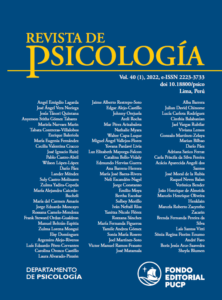Translation, adaptation, and validation of the Copenhagen Burnout Inventory for the Peruvian version
| Year | : | 2022 |
|---|---|---|
| Author/s | : | Wilson Hernández, Andrea Burneo, Mónica Cassaretto |
| Area/s | : |
Hernández, W., Burneo A. & Cassaretto M. (2022). Translation, adaptation, and validation of the Copenhagen Burnout Inventory for the Peruvian version. Revista de Psicología. 40(2), 711-738.
The goal is to adapt and analyze the psychometric properties of the Copenhagen Burnout Inventory (CBI) in workers of the national domestic violence helpline (Peru). Two measure-ments were taken in the same population (n=160). Translation-back translation was applied. Internal consistency was assessed with Cronbach’s alpha, corrected Item-Total Correlation and omega coefficient. Test-retest was performed in the second measurement. Convergent validity was examined with Pearson correlations with the Secondary Traumatic Stress Scale, the Perceived Stress Scale, and the Fear of Covid-19 Scale. Confirmatory Factor Analysis confirmed that the three-correlated factor model has the best fit. Regarding reliability, ade-quate coefficients were found (alpha: >.82, omega: >.91 and intraclass correlation: > .66). The CBI scales are correlated with the Secondary Traumatic Stress Scale, the Perceived Stress Scale, and the Fear of Covid-19 Scale, and they are also significantly associated with self-reported health status, but only work-related burnout is associated with self-reported workload. As a result, the CBI shows excellent psychometric properties.Keywords: burnout, CBI, Peru, psychometrics, stress.







